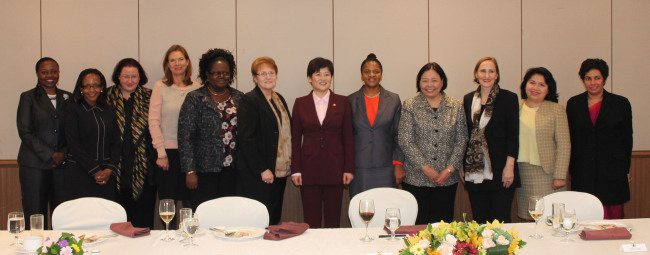Female envoys and professionals in Korea held a forum in late March to discuss empowering women in society, following the United Nations Day for Women’s Rights and International Peace on March 8.
The venue at Seoul Club, titled “Empowerment of Women,” was hosted by South African Ambassador Nozuko Gloria Bam, joined by 10 female ambassadors. Korean Minister of Gender Equality and Family Kang Eun-hee and World Bank special representative Joyce Msuya also participated.
“Today we recommit ourselves to contributing to a world in which every woman and girl enjoys the full range of rights and freedoms that is her birthright,” Bam highlighted in a speech.
“We know that when we invest in women and girls, we are not only helping them, we are helping the entire planet. A future in which they are allowed to rise and achieve their full potential will be a brighter, more peaceful and more prosperous future for us all.”
 |
Women ambassadors and professionals pose at a forum titled “Empowerment of Women” hosted by South African Ambassador Nozuko Gloria Bam (fifth from right) at Seoul Club on March 22. From left to right are Rwandan Ambassador Emma Francoise Isumbingabo, World Bank special representative Joyce Msuya, New Zealand Ambassador Clare Fearnley, Swedish Ambassador Anne Hoglund, Ghanaian Ambassador Elizabeth Nicol, Belarusian Ambassador Natallia Zhylevich, Korean Minister of Gender Equality and Family Kang Eun-hee, South African Ambassador Nozuko Gloria Bam, Malaysian Ambassador Dato Rohana Ramli, Austrian Ambassador Elisabeth Bertagnoli, Bolivian Ambassador Guadalupe Palomeque de Taboada and Sri Lankan Ambassador Manisha Gunasekera. (South African Embassy) |
Noting that the theme of this year’s International Women’s Day was “Planet 50-50 by 2030: Step it up for gender equality,” the envoy stressed implementing the U.N. Sustainable Development Goals, which includes gender equality and empowering of women and girls.
In Africa, the diplomat added, the African Union Decade of Empowerment of Women is being promoted, with leaders heralding “2016: African year of human rights with a particular focus on women’s rights” at the 26th African Union Summit in Addis Ababa, Ethiopia in January.
“In South Africa, women have for decades played a critical role in the struggle for liberation,” she said. “They have also contributed immensely in the process of building a united, democratic, nonracial, nonsexist and prosperous South Africa.”
Minister Kang echoed Bam, argued that utilizing female human resources is critical to achieving the Sustainable Development Goals. Declared by President Park Geun-hye at the U.N. summit in last September, Seoul has pledged to provide $200 million over the next five years to support education, welfare and empowerment of girls in developing nations.
“Korea is facilitating women’s economic participation through work-life balance and establishing a gender-equal culture that fits the status and prestige of our nation,” Kang said in a speech.
“The Korean government provides to young women skills enhancing programs to aid their career development, employment and entrepreneurship, through the University Career Development Centers for the Creative Economy and the Academy for Promising Women.”
The number of Women’s Reemployment Centers has risen steadily, from 110 in 2012 to 147 last year in Korea. They provide training and information for employment in high-value-added industries, including cultural content production, pharmaceuticals, 3-D printing and information and communications technology.
The government has also strengthened support for paternity leave, shorter work hours during childbirth and rearing periods and public and private child care centers, Kang noted.
By Joel Lee (
joel@heraldcorp.com)








